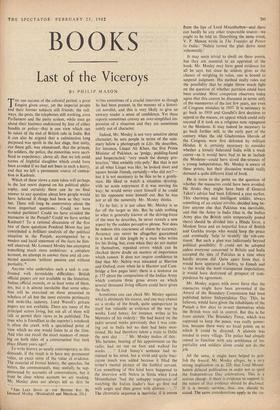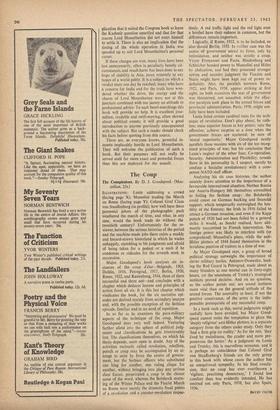BOOKS
Last of the Viceroys
BY PHILIP MASON
Pr tit: one success of the colonial period; a great 1 Empire given away, yet the imperial people and their former subjects still friends; the rail- ways, the posts, the telephones still working, even Parliament and the party system, while men go about their business undeterred by fear of either bandits or police—that is one view which can be taken of the end of British rule in India. But it can also be argued that a culmination long purposed was spoilt in the last stage, that unity, our finest gift, was abandoned; that the princes, the soldiers, the police, the minorities were sacri- ficed to expediency; above all, that we left amid scenes of frightful slaughter which could have been avoided if we had not been in such a hurry, and that we left a permanent source of conten- tion in Kashmir.
Which of these views a man takes will perhaps in the last resort depend on his political philo- sophy, and certainly there .can be no final answer to any question about how people would have behaved if things had been as they were not. There will long be controversy about the most important questions: Could we have avoided partition? Could we have avoided the massacres in the Punjab? Could we have settled Kashmir? To a rational discussion of the first two of these questions Penderel Moon has just contributed a brilliant analysis of the political situation in the Punjab, accompanied by a modest and lucid statement of the facts he him- self observed. Mr. Leonard Mosley has attempted something much more ambitious: a complete account, an attempt to answer these and all con- nected questions 'without passion and without partiality.'*
Anyone who undertakes such a task is con- fronted with formidable difficulties. British official papers are not available to the historian; Indian official records, or at least some of them, are, but it is almost inevitable that some selec- tion will be exercised on those presented to scholars of all but the most extreme pertinacity and mole-like industry. Lord Wavell's private papers are not available. There are many of the principal actors living, but not all of them will talk or permit their views to be published. The man who is friendliest to the reporter's notebook is often the crank with a specialised point of view which no one would listen to at the time. And who can recall the exact nuances of mean- ing on both sides of a conversation' that took place fifteen years ago?
To write history as nearly contemporary as this demands, if the result is to have any permanent value, an exact sense of the value of evidence. The material of formal history, the speeches, the letters, the communiques, may usefully be sup- plemented by accounts of conversations, but it must be clear whose account we are reading. Mr. Mosley does not always tell us this; he
* THE LAS "r DAYS pF THE BRITISH RAJ. By Leonard Mosley. (Weidenfcld and Nicolson, 25s.)
writes sometimes of a crucial interview as though he had been present, in the manner of a histori- cal novelist, and this is very likely to give an unwary reader a sense of confidence. Yet these reports sometimes convey an over-simplified im- pression of a situation and they are sometimes subtly out of character.
Indeed, Mr. Mosley is not very sensitive about character; he sees people in terms of the sum- mary below a photograph in Life. He describes, for instance, Liaqat All Khan, the first Prime Minister of Pakistan, as 'podgy, pudding-faced and bespectacled,' 'very much the dumpy pro- letarian,' that amiable roly-poly.' But that is not at all what Liaqat was like; he looked short and square beside Jinnah, certainly—who did not?— but it is not necessary to be thin to be a gentle- man. He liked to watch a situation develop, with an acute enjoyment if it was moving his way; he would never exert himself if he could let his opponent wear himself out. But he was not at all the nonentity Mr. Mosley thinks.
To be fair, it is not often Mr. Mosley is so far off the target as this. But he adds nothing to what is generally known of the driving-force of the men he describes, he never reveals a new aspect by the sudden perceptive phrase. Nor does he redeem this coarseness of vision by accuracy. Accuracy can never be altogether guaranteed in a book of this length by a man who writes for his living, but, even when they do not matter in themselves, repeated errors which can be checked throw doubt on matters of importance which cannot. It does not inspire confidence to find that Mr. Nehru was educated at Harrow and Oxford, even when he is Harrow and Cam- bridge a few pages later; there is a Sentence on p. 137 about the composition of the Indian Army which contains three gross errors on which several thousand living officers could have given the facts.
Sometimes one can check Mr. Mosley against what is obviously his source, and one may chance on a stroke of the brush, quite unimportant in itself but valuable as evidence of the way he works. Lord lsmay, for instance, writes in his Memoirs of his orderly: 'He had heard on the radio several weeks previously that I was com- ing out to India but no date had been men- tioned. He had therefore taken a train to Delhi the next day. . . .' Mr. Mosley makes of this: 'His batman, hearing of his appointment on the radio, had set out on foot and walked for weeks. . .' Lord Ismay's sentence had re- mained in his mind, but a vivid and quite inac- curate touch was added because it filled the writer's mental picture of the faithful servant. Can something of this kind have happened to the interview with Nehru in Simla when Lord Mountbatten 'had the unhappy experience of watching the Indian leader's face go first red with anger and then green with distress The chromatic sequence is inartistic; if it comes
from the lips of Lord Mountbatten—and there can hardly be any other respectable source—we ought to be told so. Describing the same event, V. P. Menon wrote in The Transfer of Power in India: 'Nehru turned the plan down most vehemently.'
It may seem trivial to dwell on these points, but they are essential to an appraisal of the book. Mr. Mosley may have good evidence for all he says, but since he seldom gives us the chance of weighing its value, one is bound to suspend judgment. His method really rules out the possibility that he might throw much light on the question of whether partition could have been avoided. Most competent observers today agree that this cannot be discussed in terms only of the manoeuvres of the last few years, nor even of Congress mistakes in 1937. It is necessary to go back to 1919 and Gandhi's first decision to appeal to the masses, an appeal which could only succeed if it took on a religious note repugnant to the Moslems. It may indeed be necessary to go back further still, to the early part of the century when the old Gladstonian liberals of the Congress were first defeated by militant Hindus. It is certainly necessary to consider whether a loosely federated India with a weak centre—as it would have had to be to include the Moslems—could have stood the-stresses of a young independence. Mr. Mosley is aware of these points, but their discussion would really demand a quite different kind of book.
He is more to the point on the question of whether the massacres could have been avoided. He thinks they might have been if General Tuker's advice had been followed a year earlier. This charming and intelligent soldier, always something of an enfant terrible, decided long be- fore anyone else that Pakistan was inevitable, and that the Army in India (that is, the Indian Army plus the British units temporarily posted there) should be divided into a Hindu force, a Moslem force and an impartial force of British and Gurkha troops who would keep the peace and eventually 'help to re-unify the sub-con- tinent.' But such a plan was ludicrously beyond political possibility. It could not be adopted unless everyone concerned in Britain and India accepted the idea of Pakistan at a time when hardly anyone did. Quite apart from that, it would have appeared to Nehru, to Jinnah and to the world the most transparent imperialism; it would have destroyed all prospect of inde- pendence by agreement.
Mr. Mosley argues with more force that the massacres might have been prevented if the Award of the Boundary Commission had been published before Independence Day. This, he believes, would have given the inhabitants of the Punjab a few days to re-sort themselves while the British were still in control. But this is far from certain. The Boundary Force, which was supposed to keep the peace, was really power- less, because there were no focal points on to which it could be directed. A platoon was needed in every village. The police had already ceased to function with any semblance of im- partiality and soldiers alone could not do .the job.
All the same, it might have helped to pub- lish the Award. Mr. Mosley alleges, by a very strong implication on p. 229, that Lord Mount- batten delayed publication in order not to spoil the Independence Day celebrations. This is a serious charge: if there is evidence to support it, the nature of that evidence should be disclosed. If it is merely surmise, that, too, should he stated. The same considerations apply to the im- plication that it suited the Congress book to leave the Kashmir question unsettled and that for that reason Lord Mountbatten did not exert himself to settle it. There is also an implication that the timing of the whole operation in India was speeded up to suit Lord Mountbatten's personal career.
If these charges are true, many lives have been lost unnecessarily, often in peculiarly beastly cir- cumstances, and much harm has been done to any hope of stability in Asia, more remotely to any hopes of a world polity. It is a subject on which a verdict must one day be reached; many who have a concern for India and for the truth have won- dered whether the drive, the energy and the charm of Lord Mountbatten were not at this juncture combined with too jaunty an attitude to professional advice. To such heart-searchings this book will provide no help. It is excellent jour- nalism, readable and swift-moving, often shrewd about political events; it will provide a good introduction to anyone previously unacquainted with the subject. But such a reader should check his facts before quoting from this source.
There are, as everyone knows, powerful in- terests implacably hostile to Lord Mountbatten. They will welcome the publication of such a book. But their purposes will not really be served until far more exact and powerful forces than this are deployed for the assault.



































 Previous page
Previous page